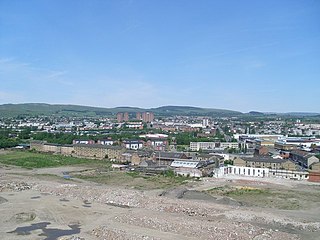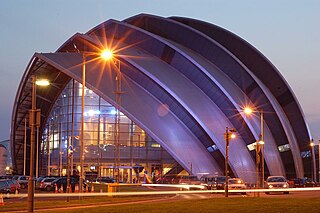Related Research Articles

The River Clyde is a river that flows into the Firth of Clyde in Scotland. It is the ninth-longest river in the United Kingdom, and the third-longest in Scotland. It runs through the major city of Glasgow. Historically, it was important to the British Empire because of its role in shipbuilding and trade. To the Romans, it was Clota, and in the early medieval Cumbric language, it was known as Clud or Clut. It was central to the Kingdom of Strathclyde.

Glasgow is the most populous city in Scotland and the fourth-most populous city in the United Kingdom, as well as being the 27th largest city by population in Europe. In 2020, it had an estimated population of 635,640. Straddling the border between historic Lanarkshire and Renfrewshire, the city now forms the Glasgow City Council area, one of the 32 council areas of Scotland, and is governed by Glasgow City Council. It is situated on the River Clyde in the country's West Central Lowlands.

Simple Minds are a Scottish rock band formed in Glasgow in 1977. They have released a string of hit singles, becoming best known internationally for "Don't You " (1985), which topped the Billboard Hot 100 in the United States. Other commercially successful singles include "Glittering Prize" (1982), "Someone Somewhere in Summertime" (1982), "Waterfront" (1983) and "Alive and Kicking" (1985), as well as the UK number one single "Belfast Child" (1989).

"Scotland the Brave" is a Scottish patriotic song, one of several often considered an unofficial Scottish national anthem.

Maryhill is an area of the City of Glasgow in Scotland. Maryhill is a former burgh. Maryhill stretches over 7 miles (11 km) along Maryhill Road. The Maryhill district has several sub-districts, such as Acre, Botany, Dawsholm Park, Firhill, Gairbraid, Gilshochill, Maryhill Park, North Kelvinside, Queen's Cross, St George's Cross, Cadder, Summerston, Woodside and Wyndford.
The Gorbals is an area in the city of Glasgow, Scotland, on the south bank of the River Clyde. By the late 19th century, it had become densely populated; rural migrants and immigrants were attracted by the new industries and employment opportunities of Glasgow. At its peak, during the 1930s, the wider Gorbals district had swollen in population to an estimated 90,000 residents. Along with its relatively small size, this gave the area a very high population density of around 40,000/km². Redevelopment after WWII has taken many turns, and the area's population is substantially smaller today.
Red Clydeside was the era of political radicalism in Glasgow, Scotland, and areas around the city, on the banks of the River Clyde, such as Clydebank, Greenock, Dumbarton and Paisley, from the 1910s until the early 1930s. Red Clydeside is a significant part of the history of the labour movement in Britain as a whole, and Scotland in particular.

Clydebank is a town in West Dunbartonshire, Scotland. Situated on the north bank of the River Clyde, it borders the village of Old Kilpatrick to the west, and the Yoker and Drumchapel areas of the adjacent City of Glasgow immediately to the east. Depending on the definition of the town's boundaries, the suburban areas of Duntocher, Faifley and Hardgate either surround Clydebank to the north, or are its northern outskirts, with the Kilpatrick Hills beyond.
Flowers of the Forest, or The Fluuers o the Forest, is a Scottish folk tune and work of war poetry commemorating the defeat of the Scottish army of James IV at the Battle of Flodden in September 1513. Although the original words are unknown, the melody was recorded c. 1615–1625 in the John Skene of Halyards Manuscript as "Flowres of the Forrest", although it might have been composed earlier.
"The Skye Boat Song" is a late 19th-century Scottish song recalling the journey of Prince Charles Edward Stuart from Benbecula to the Isle of Skye as he evaded capture by government troops after his defeat at the Battle of Culloden in 1746.

Anderston is an area of Glasgow, Scotland. It is on the north bank of the River Clyde and forms the south western edge of the city centre. Established as a village of handloom weavers in the early 18th century, Anderston was an independent burgh of barony from 1824 until it was incorporated into the City of Glasgow in 1846.
"The Water Is Wide" is a folk song of Scottish origin. It remains popular in the 21st century. Cecil Sharp published the song in Folk Songs From Somerset (1906).

"The Night the Lights Went Out in Georgia" is a Southern Gothic murder ballad, written in 1972 by songwriter Bobby Russell and first recorded by his then wife, singer and comedian Vicki Lawrence. Lawrence's version, from her 1973 album of the same name, went to number one on the Billboard Hot 100 after its release. Of several cover versions, the one recorded by Reba McEntire for her 1991 album For My Broken Heart peaked at number 12 on Hot Country Songs.
Kenneth McKellar was a Scottish tenor.
Dalmarnock is a district in the Scottish city of Glasgow. It is situated east of the city centre, directly north of the River Clyde opposite the town of Rutherglen. It is also bounded by the Glasgow neighbourhoods of Parkhead to the north-east and Bridgeton to the north-west.

The SEC Armadillo is an auditorium located near the River Clyde, in Glasgow, Scotland. It is one of three venues on the Scottish Event Campus, which includes the SEC Centre and the OVO Hydro.
"The Parting Glass" is a Scottish traditional song, often sung at the end of a gathering of friends. It has also long been sung in Ireland, enjoying considerable popularity to this day and strongly influencing the style in which it is often now sung. It was purportedly the most popular parting song sung in Scotland before Robert Burns wrote "Auld Lang Syne".
"Willow's Song" is a ballad by American composer Paul Giovanni for the 1973 film The Wicker Man
"Mairi's Wedding" is a Scottish folk song originally written in Gaelic by John Roderick Bannerman (1865–1938) for Mary C. MacNiven (1905–1997) on the occasion of her winning the gold medal at the National Mòd in 1934. In 1959, James B. Cosh devised a Scottish country dance to the tune, which is 40 bars, in reel time.
Braehead Park, originally known as Hibernian Park, was a football ground in the Oatlands area of Glasgow, Scotland. It was the home ground of Glasgow Hibernian from 1889 until 1890, then used by Thistle from 1892 until they folded in 1895.